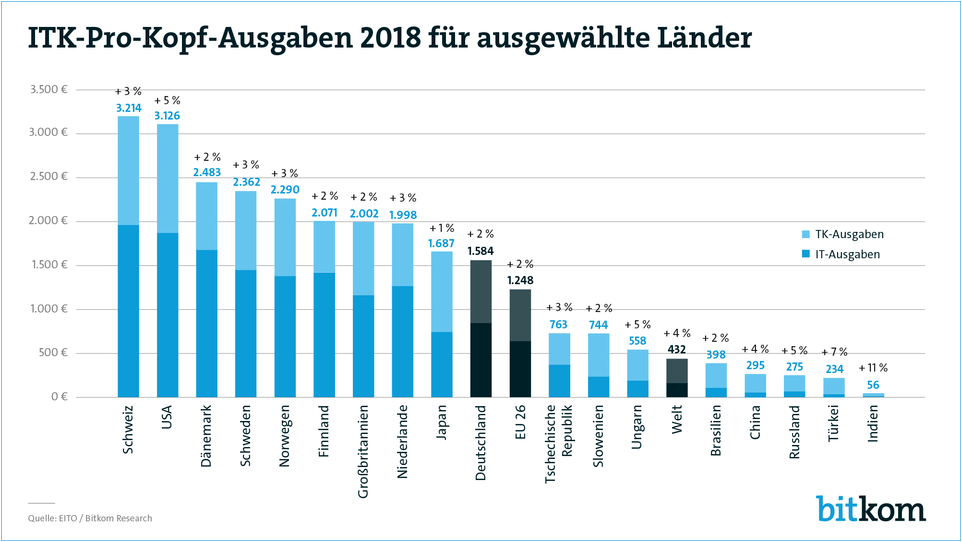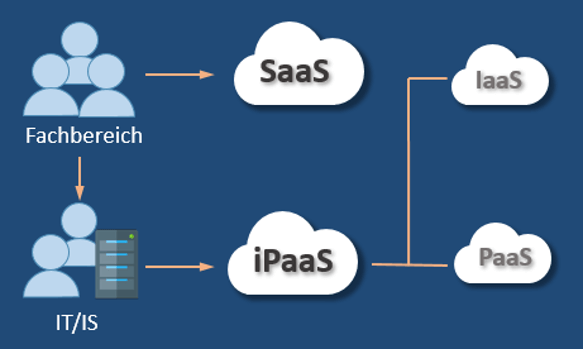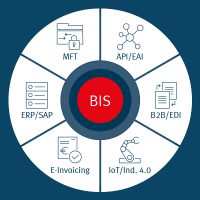Corona Crisis – The Indicator For The Progress Of Your Digitalization Process

The COVID-19 virus poses an acute threat to our economy. In this situation, it is easy to see the extent of the digital transformation in your company and how quickly you can react to massive market changes. Offering flexible and fast adaptation to all needs, cloud services reduce costs and offer the highest possible security. In these times, such solutions can be a livelihood guarantee.
Digitalization is keyThe Corona pandemic presents companies with a whole range of unexpected challenges. First and foremost is the protection of the health of employees, relatives, customers and partners. The real skill is not to lose sight of business management issues and to keep day-to-day business running. Actions such as: |
- Preserving liquidity and reducing costs in the short term
- Maintaining the ability to act and make decisions
- Strengthening innovation and competitiveness
are particularly urgent in these times.
One thing is certain: the economy will look different after this crisis. Existing digitalization deficits will be exposed and exacerbated. Lack of digital competitiveness will now be harshly targeted. The pace of automation and market concentration will increase. Existing backlogs in digital disciplines (e-government, e-health, e-learning, digital infrastructure, API management, IoT, digital business models, B2B communication, remote work) are being mercilessly exposed by the Corona crisis.
Having scanned homework sheets and teaching material instead of online lessons for our school-age children is annoying, crowded doctor’s waiting rooms instead of remote health services are dangerous and as a trader selling exclusively over the counter instead of offering online sales is even threatening their existence. Those suppliers who have not yet gone digital are now losing customers. Companies without a digital business model will be hit harder by the Corona crisis than companies that took the plunge into digitalization early on. The pioneers of digitalization – and that is obvious now – will emerge from this crisis as winners. Nevertheless, it is not too late for everyone else to act and initiate the process of digital transformation.
Crisis fuels digitalization
In a trend survey conducted by Dmexco, about 70 percent of the German survey participants expect the speed of digital transformation to be increased by the Corona pandemic. According to a recent Bitkom study (Bitkom is Germany’s digital association), however, German companies have only made a small step forward in digitization over the past 12 months.
Germany is the fourth-largest economy, world champion in exports and the industrial motor of Europe. However, this leading role is threatened by a future world that will be completely digitalised. In a representative Bitkom survey, a clear majority (58 percent) of managing directors and board members across all industries stated that their company was a late adopter to digitalization. 3 percent even think they have missed the boat. 37 percent say they cannot cope with the digitalization, 12 percent even feel their existence is threatened by the digitalization.
Other countries such as China, Korea, the USA and Denmark are setting the pace in digitalization by abandoning uneconomic analogous processes with great commitment and enthusiasm. In the USA, per capita IT investments are already twice as high as in Germany – and they are growing twice as fast. The gap between winners and losers of digitalization is widening day by day.

Cloud-Computing simplifies and accelerates digitalization
The Corona pandemic has forced governments to impose travel restrictions and border closures, and companies to reduce working hours and close plants. These regulations have very negative effects on supply chains and the national and international exchange of goods. The automotive, construction and non-food retail sectors have been particularly affected. The global easing of lockdown restrictions is slowly leading to an economic recovery and a revival of supply chains. In the gradual resumption of operations after the lockdown, companies must use their resources in a targeted and cost-conscious manner. Companies that are already advanced on their way to the cloud already have a clear competitive advantage.
 | IaaS: Infrastructure as a Service ‘Infrastructure Level’ Provision of network infrastructure, computing power and storage infrastructure PaaS: Platform as a Service ‘Developer Level’ Provision of frameworks SaaS: Software as a Service ‘User Level’ Provision of software iPaaS: Integration Platform as a Service ‘Integration Level’ Provision of integration infrastructure |
Fig.: The various categories of cloud services for your digitalization needs
Digitalization of a company can be pushed and simplified through various categories of cloud services as needed. In addition to Infrastructure as a Service (IaaS), the cloud computing models Platform as a Service (PaaS) and Software as a Service (SaaS) are the most frequently used. The IaaS and PaaS offerings are primarily aimed at corporate IT departments. They determine the IaaS and PaaS vendor they prefer for their business. For SaaS applications, on the other hand, it is primarily the business departments that decide, so companies are using a steadily growing number of SaaS applications from many different SaaS providers.
With the growing number of SaaS applications, the central use of Integration Platform as a Service (iPaaS) is recommended, which is then decided by IT – after all, IT must maintain an overview of the many connected systems and remain capable of acting appropriately. The categories mentioned above allow a company the greatest flexibility and release it from time-consuming maintenance and servicing work.
Companies can save money – especially in the area of Software as a Service. The software required by the company no longer has to be purchased as a capital expenditure, installed on all computers, maintained and kept up-to-date. Instead, the required number of software workstations is specifically rented (operational expenditure) from a professional cloud service provider. This not only saves money for the provision of the respective application in the company, but also personnel costs, as the company’s own IT department can usually be significantly downsized. On the other hand, digitalization via cloud computing allows a very high degree of flexibility. Companies can manage the term of contracts with their cloud computing provider at will. If the company has to change or switch to different software, for example, this can be done quickly and easily without major investments. Especially in the Corona age, flexibility is an increasingly important factor with which companies can set themselves apart from competition. After all, if the required software or platforms are made available directly in the cloud, new processes and new production possibilities can be developed faster and more cost-effectively.
Additionally, the possibility of centralized data storage in the cloud, which is already actively used in many companies, is a further advantage. Especially in these times, many employees can quickly and easily access the company’s data and entries from home and work flexibly and efficiently.
The advantages of digitalization via cloud services
- Scalability on demand
Companies that operate their own IT infrastructure must ensure that even in the long term sufficient computing power and storage space is available for a wide range of requests and tasks. The issue of scalability becomes a critical challenge if growth or unforeseen demand is involved. For example, if a new service is introduced that is to be used by all customers overnight, the entire IT infrastructure may have to be adapted to it. After all, data traffic can increase considerably if new and, above all, networked products or services are offered. With cloud services, this can be mastered very easily. If the need grows – even unexpectedly or by leaps and bounds – more storage space or computing power is simply added. The cloud offers ideal conditions for scaling business models or individual use cases. - Easy agility increase
The IT infrastructure and also the size of the company play a central role when it comes to agility. The larger a company, the more rigid its structures become, and agility and innovative ability tend to decline. Smaller teams or start-ups have a strategic advantage here. The cloud represents an interesting approach to increasing agility, especially for larger companies. Independent of existing structures, the cloud offers a basis for developing new products and testing them on the market, for example. As success increases, capacities can be easily scaled up and adapted from the cloud. - Fast data access
The manufacturing industry is dependent on processing the data sets generated in the automated production plants and obtaining new information through their analysis. The analysis of production data helps to optimize processes: - Predictive maintenance minimizes downtime
- Real-time monitoring of production detects possible errors in real time
This enables companies to increase quality and efficiency in production. Additionally, data can be used to optimize the supply chain and customer approach.
High data security
- While 100% security can never be guaranteed – not even in cloud computing – the security features of cloud providers are among the best on the market. Small and medium-sized companies especially tend to underestimate the risk of falling victim to a cyber-attack (not to mention their own human error). Usually they are poorly protected against data loss, failures, corrupted systems, etc. and are rarely able to provide full data recovery at short notice. With a professional cloud solution, you put this responsibility in expert hands with the highest possible security measures.
Cloud services not only facilitate day-to-day business, but also make innovation possible in times of budget cuts.
Would you like to drive forward digitalization and tackle and optimize your cloud strategy? Please feel free to get in touch with us!
Thank you for your message
We appreciate your interest in SEEBURGER
Get in contact with us:
Please enter details about your project in the message section so we can direct your inquiry to the right consultant.
Written by: Peter Fels
Peter Fels is Product Manager D-A-CH (Germany, Austria, Swiss) at SEEBURGER for the automated processing of incoming invoices for all non-SAP systems. Mr. Fels has many years of experience regarding the conversion from paper to the electronic invoicing processes.





